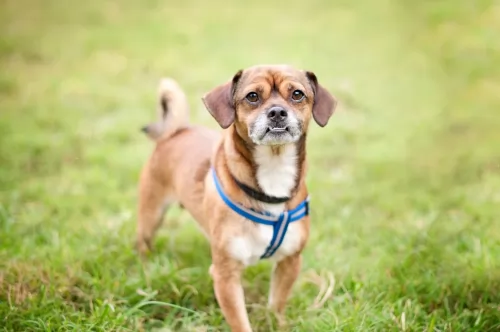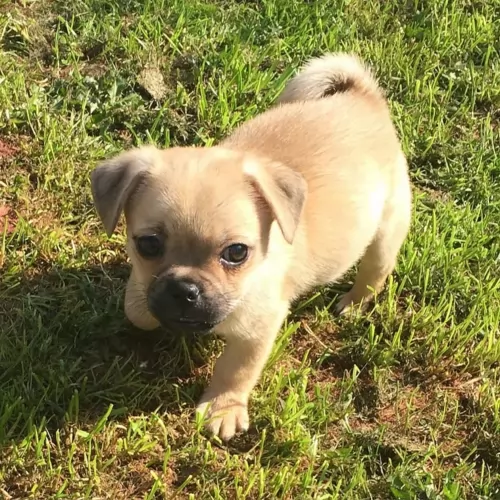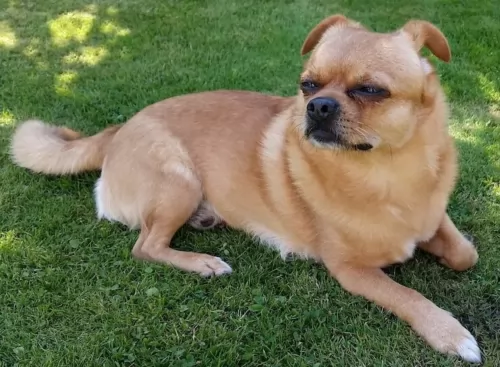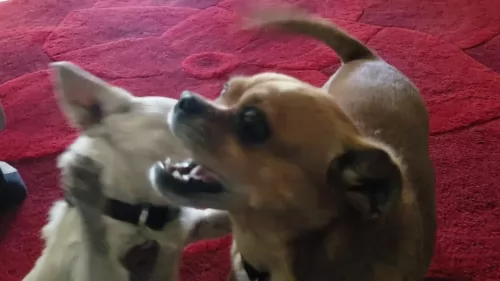 Petzlover
Petzlover Chug is originated from United States but Tibetan Mastiff is originated from China. Chug may grow 58 cm / 22 inches shorter than Tibetan Mastiff. Chug may weigh 81 kg / 178 pounds lesser than Tibetan Mastiff. Both Chug and Tibetan Mastiff has almost same life span. Both Chug and Tibetan Mastiff has almost same litter size. Both Chug and Tibetan Mastiff requires Moderate Maintenance.
Chug is originated from United States but Tibetan Mastiff is originated from China. Chug may grow 58 cm / 22 inches shorter than Tibetan Mastiff. Chug may weigh 81 kg / 178 pounds lesser than Tibetan Mastiff. Both Chug and Tibetan Mastiff has almost same life span. Both Chug and Tibetan Mastiff has almost same litter size. Both Chug and Tibetan Mastiff requires Moderate Maintenance.
 The Chug is a crossbreed with the Pug and the Chihuahua. It is a hybrid not a purebred. Over the past ten to fifteen years people have been developing the Chug, mostly in the United States. People were looking for a lapdog with the characteristics of both the Chihuahua and the Pug. The hybrid dog has characteristics of both breeds, both physical and behavioral. Of course, the Chug is not recognized by the AKC, but it is recognized by hybrid and designer dog clubs such as The American Canine Hybrid Club, Designer Breed Kennel and the International Designer Canine Registry.
The Chug is a crossbreed with the Pug and the Chihuahua. It is a hybrid not a purebred. Over the past ten to fifteen years people have been developing the Chug, mostly in the United States. People were looking for a lapdog with the characteristics of both the Chihuahua and the Pug. The hybrid dog has characteristics of both breeds, both physical and behavioral. Of course, the Chug is not recognized by the AKC, but it is recognized by hybrid and designer dog clubs such as The American Canine Hybrid Club, Designer Breed Kennel and the International Designer Canine Registry.
 The Tibetan Mastiff is still considered to be a primitive breed originating in Tibet centuries ago. The breed was developed to guard property and livestock. They still do this as well as being a much loved family dog and a show dog as well. There is very little history that is documented for the breed prior to the 19th century.
The Tibetan Mastiff is still considered to be a primitive breed originating in Tibet centuries ago. The breed was developed to guard property and livestock. They still do this as well as being a much loved family dog and a show dog as well. There is very little history that is documented for the breed prior to the 19th century.
Believed to be centuries old with ancestors who are mastiff like dogs that developed into two different types of Tibetan Mastiffs. These types are the Tsang-Khyi and the Do-Khyi. The Tsang Khyi were guardians for Tibetan monks, while the Tsang-Khyi guarded flocks for nomadic shepherds and in villages.
The first Tibetan Mastiff was imported in 1847 to England and presented as a gift to Wueen Victoria, from India’s Viceroy. By 1873 there was an English Kennel Club and the breed was labeled a large dog from Tibet and entered into the EKC Stud Book.
The next year the future King Edward VII, brought another two Tibetan Mastiffs to the United Kingdom to show in 1875. The first breed club began in 1931. The world wars interfered and no new dogs were imported to England until 1976. Two dogs were given to the President of the United States in the late 1950’sbut were not bred and it wasn’t until 1970 that any more were imported. The US Tibetan Mastiff Club was not founded until 1974 and they were first entered in a National Specialty show in 1979.
In 2007 the AKC recognized the breed as a working dog since 2007. It’s hard to find a purebred Tibetan Mastiff in Tibet anymore.
 The Chug can vary greatly in looks and build from one dog to another. For the most part however, Chugs are small compact dogs, sturdy and muscular. They have a very expressive and lovable face with folding ears, almond shape eyes and short muzzles. Their faces are similar in looks to that of a miniature boxer. .
The Chug can vary greatly in looks and build from one dog to another. For the most part however, Chugs are small compact dogs, sturdy and muscular. They have a very expressive and lovable face with folding ears, almond shape eyes and short muzzles. Their faces are similar in looks to that of a miniature boxer. .
 Both types of Mastiffs can be present in the same litter, so that both larger and smaller pups are present. Both types are well-muscled and structured. Today’s dogs being developed in China and the West are much larger than the previous ones. These dogs would be less useful to the nomads and cost too much to feed. Today’s dog is very large with a large head and a long double coat. This coat can be black, brown, gold, and blue, with or without tan markings. There are now a few white Tibetan Mastiffs being bread.
Both types of Mastiffs can be present in the same litter, so that both larger and smaller pups are present. Both types are well-muscled and structured. Today’s dogs being developed in China and the West are much larger than the previous ones. These dogs would be less useful to the nomads and cost too much to feed. Today’s dog is very large with a large head and a long double coat. This coat can be black, brown, gold, and blue, with or without tan markings. There are now a few white Tibetan Mastiffs being bread.
The breed standard for the Mastiff is different in the West than in the East. In the East the breed is broken into two categories – the Lion Head and the Tiger head.
 Because they are a hybrid, chugs can have a very wide range of different characteristics depending upon whether they have more from the Pug or more from the Chihuahua. But either way they are very lovable little dogs with big personalities. Regardless of whether your dog favors the clown Pug or the stately Chihuahua, your puppy will be a lovable ball of fur. He will be affectionate, friendly and aggressive to bigger dogs.
Because they are a hybrid, chugs can have a very wide range of different characteristics depending upon whether they have more from the Pug or more from the Chihuahua. But either way they are very lovable little dogs with big personalities. Regardless of whether your dog favors the clown Pug or the stately Chihuahua, your puppy will be a lovable ball of fur. He will be affectionate, friendly and aggressive to bigger dogs.
 Though considered a primitive dog and isolated for several centuries, so they should not have as many genetic or inherited conditions as other dogs with more cross and in-breeding. These are the potential health issues they might develop:
Though considered a primitive dog and isolated for several centuries, so they should not have as many genetic or inherited conditions as other dogs with more cross and in-breeding. These are the potential health issues they might develop:
Elbow and Hip dysplasia – can lead to lameness and arthritis.
OCD Osteochondrois Dissecans – this is also an orthopedic condition when the soft tissue growth is abnormal in the joints. It is painful and the joint is stiff. Don’t breed a dog that has this condition.
Panosteitis – Canine growing pains. Inflammation of the long bones in large dogs as they grow. They will eventually out grow it. Pain can be managed through medication.
Autoimmune Hypothyroidism – Hormone deficiency leading to flaky skin, weight gain and lack of energy. Can be managed through medication.
Canine Inherited Demyelinative Neuropathy – If your Tibetan Mastiff is going to have this condition, they will have it by six weeks of age. Weakness in the hind legs leading to paralysis.
Bloat – deadly if not treated immediately and related to dietary habits.
 Pugs have great appetites and love to eat and Chihuahuas wont turn down a meal so be careful not to overfeed your Chug. It is important to feed a small breed formula whether you use dry or wet food.
Pugs have great appetites and love to eat and Chihuahuas wont turn down a meal so be careful not to overfeed your Chug. It is important to feed a small breed formula whether you use dry or wet food.
Some additional issues that Chugs deal with in respect to health include:
Both elbow and knee inflammations can lead to arthritis and lameness
Chugs can have runny eyes or cherry eye. If they have cherry eye you will want to treat it immediately or there could be secondary issues with inflammation and infection.
Chugs may be little, but they still need a moderate amount of exercise every day. A regular walk will do or indoor or outdoor playtime every day. They like obedience, rally and some can do small dog agility, but they would have to be on the larger size for Chugs. Chugs also make great therapy dogs.
 Don’t feed the puppy too much protein as you want to prevent Panosteitis and growing too quickly. Do not overfeed. Feed 4-5 cups of high quality large breed puppy food in 3-4 meals day.
Don’t feed the puppy too much protein as you want to prevent Panosteitis and growing too quickly. Do not overfeed. Feed 4-5 cups of high quality large breed puppy food in 3-4 meals day.
4 to 6 or more cups of a high-quality dog food daily, divided into two meals. To avoid bloat do not feed before or after vigorous exercise.
Calm and laid back when inside.
They need 20-30 minutes of vigorous exercise and play daily. They prefer to play with other large dogs.